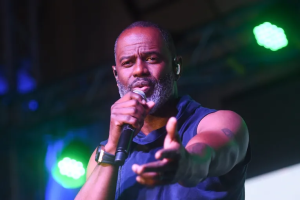Is it possible to steal a rock festival?
That’s the charge being made by AEG in court documents filed in LA Superior Court yesterday (Nov. 29), alleging that promoter Danny Wimmer illegally “divorced” himself from AEG, shut down the two festivals the companies had been working on together and relaunched new competing festivals under Wimmer's sole ownership.
AEG's attorney's say Wimmer "relied upon deceit and fraud to achieve its goal of stealing these highly acclaimed festivals," alleging that Wimmer’s Epicenter festival at Rockingham Festival Grounds, which was unveiled today with a lineup announcement slated for Monday (Dec. 3) is a carbon copy of the Carolina Rebellion festival the two had produced at Charlotte Motor Speedway since 2011. AEG also alleges that Wimmer illegally replaced the popular Rock on the Range festival at MAPFRE Stadium in Columbus, Ohio, renaming the event Sonic Temple with Wimmer retaining sole control of the new entity.
Industry sources tell Billboard that tensions between the two companies had been brewing for years and that while the two had a co-promotion agreement for both events, their deal also included language that allowed either side to walk away from the agreement and create a competing event. Creative differences between the two sides began to boil over in 2015, sources say, but neither side could come to an agreement to buy or sell their stake in the festival. Sources also say that AEG had tried to create a competing festival down the street from the MAPRE Stadium at Ohio Stadium on the same weekend as Epicenter Festival, but ultimately didn't proceed with the event.
"AEG lost the competition, so now they're suing" said one source familiar with the two sides. "This is an unfortunate case of sour grapes."
In September, Wimmer and his parter Gary Spivak announced that they were “divorcing” AEG on a Columbus radio station, saying "we have spent so much time looking at what everybody is doing and I use this word inflection point because what Gary and I think the vision of this show should be and what our partner thinks this show should be is much different.”
Spivack went on to tell the WKRZ-FM radio host “everything is staying the same. It’s a simple name change. It’s just going to be bigger and better. It’s at the same stadium. It’s in the same city. It’s going to be rock and roll.”
Attorneys for AEG allege that Spivak and Wimmer rejected multiple offers by AEG to either sell their stake in the company or buy out AEG’s stake for five times the event's earnings.
“(Wimmer) chose to do neither, as it had secretly and deceptively laid the groundwork to take the goodwill associated with both Festivals for itself without compensating AEG at all,” the complaint reads. On Sept. 7, Wimmer announced his new event for Ohio would be called Sonic Temple Art + Music Festival, produced solely by Wimmer.
Then earlier today, Wimmer sent out a new press release announcing Epicenter Festival in North Carolina, saying "we are very proud of what Carolina Rebellion represented, so we understand that our decision to replace it was confusing to people. It took more time than we had hoped to make the final decision and then work out all of the details."
Wimmer went on to add 'the creation of the 'Epicenter of rock n' roll' in the heart of North Carolina gives us the ability to expand on the festival experience," adding "there’s always a next level to strive for -- and after eight great years of Carolina Rebellion, Epicenter is that next level."
According to the lawsuit, Hayes allegedly "persuaded" AEG to allow Wimmer to handle the festivals venue relationship and directly liaison with MAPFRE Stadium in Columbus. The suit says that "instead of negotiating on behalf of the Partnerships, (Danny Wimmer Presents) secretly negotiated its own deals with the venues that had previously hosted the festivals."
When AEG became aware that Wimmer wanted out of the partnership, AEG entered into negotiations to either sell its share of the festival or buy Wimmer's stake. Wimmer allegedly responded by saying that neither side owned either event and offered AEG a five percent royalty to use the Rock on the Range name, When AEG rejected that offer, Wimmer parted ways and told agents and media members that two parties had "divorced."
"What DWP has failed to tell the public is that unlike in most divorces, where the partners liquidate the assets and distribute them to each of the partners, here (Wimmer) a latecomer to the partnerships, has unilaterally taken for itself the partnerships’ sole assets -- Rock on the Range and Carolina Rebellion -- in their entirety, without AEG’s consent and without compensating AEG or its share of such assets," the lawsuit reads.
Rock on the Range was created in 2007 and in its first year sold 35,000 tickets. After 12 years, the event "reached its pinnacle in May 2018" according to the lawsuit, growing to a 140,000-person festival that took place over three days with 2018 profits seven times higher than what they were in 2007, AEG alleges. AEG’s original partner for both Rock on the Range and Carolina Rebellion was a boutique concert promotion firm called Right Arm Entertainment, which transfered its stake to Wimmer in 2014.
According to the suit, prior to buying Right Arm’s stake, Wimmer has told AEG that he believed his predecessor’s stake in both Rock on the Range and Carolina Rising was valued between $21 to $36 million and attorneys for AEG allege that Wimmer later used that valuation to accept an investment from the United Auburn Indian Community Development Corp in 2015. Later that year, Wimmer allegedly approached AEG and asked to be bought out of both festivals for $30 million, an offer AEG rejected according to their attorneys.
In August 2018, Wimmer allegedly told AEG he wanted out of their partnership and offered to buy AEG’s stake in both festivals for three times the event's earnings, which AEG said was only a "fraction" of what Wimmer had offered to sell the event for in 2015. Negotiations between the two sides eventually broke down and Wimmer allegedly began making preparations for his new events, doing radio interviews, sending out press releases and appearing on Facebook to talk about his part work on both Rock on the Range and Carolina Rebellion and to discuss his vision for Sonic Temple and Epicenter.
AEG is suing Wimmer on 25 civil counts, alleging breach of fiduciary duty, fraudulent misrepresentation, breach of contract, unfair competition and trademark infringement.





